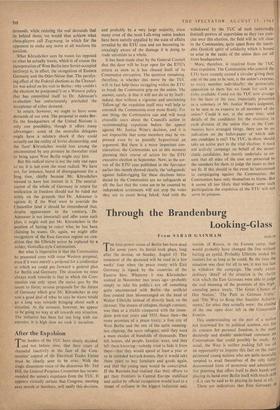After the Ex p ulsion The, leaders of the TUC have clearly
decided, 1 and not before time, that their years of shameful inactivity in the face of the Com- munists' control of the Electrical Trades Union must be clearly seen to be over. With the single dissentient voice of the disastrous Mr. Ted Hill, the General Purposes Committee has recom- mended the union's expulsion from the TUC. It appears virtually certain that Congress, meeting next month at Southsea. will ratify this decision, and probably by a very large majority, since many even of the most Left-wing union leaders have been naively appalled by the state of affairs revealed by the ETU case and are becoming in- creasingly aware of the damage it is doing to trade unionism as a whole.
It has been made clear by the General Council that the door will be kept open for the ETU's return as soon as it has cleared itself of its Communist corruption. The question remaining, therefore, is whether this move by the TUC will in fact help those struggling within the ETU to break the Communist grip on the union. The answer, surely, is that it will not do so by itself : indeed, that without a vigorous and unrelenting 'follow-up' the expulsion itself may well help to entrench the Communists even more firmly. For one thing, the Communists can and will weep crocodile tears about the Council's action in recommending expulsion before the appeal against Mr. Justice Winn's decision, and it is not impossible that some members may be im- pressed even by so patently hypocritical an argument. But there is a more important con- sideration; the Communists are at this moment planning their course of action for the ETU executive election in September. Now, as the sur- vey of the ETU case published in the Spectator earlier this month showed clearly, the 'safeguards' against ballot-rigging for these elections intro- duced by the Communists are no safeguards at all; the fact that the votes are to be counted by independent scrutineers will not stop the votes they are to count being faked. And with the withdrawal by the TUC of such (admittedly limited) powers of supervision as they can exer- cise over this election, the field will be left clear to the Communists, quite apart from the inevit- able Dunkirk spirit of solidarity which is .bound to arise in the ranks of the union thus cut off from headquarters.
' More, • therefore, is required from the TUC than expulsion The Communists who control the EI-U have recently caused a circular giving their side of the case to be sent, at the union's expense, to every member individually: the democratic opposition to them has no funds for such ac- tivity available. Could not the TUC now arrange for the facts of the case. impartially presented as a summary of Mr. Justice Winn's judgment. to be sent at its expense to all members of the union? Could it not, at the same time, send details of the candidates for the executive in each division of the union (for, as the Corn- ' munists have arranged things, there can be no indication on the ballot-paper of which side any candidate is on)? The TUC, in short, should take an active part in the vital election; it need not actively campaign on behalf of the demo- cratic candidates, but merely undertake to en- sure that all sides of the case are presented to the members for them to judge the issues as they see fit. If this should in the event be tantamount to campaigning against the Communists, the Communists have only themselves to blame. But it seems all too likely that without some such participation the expulsion of the ETU will not serve its purpose.






























 Previous page
Previous page